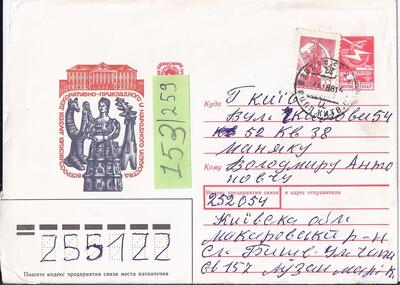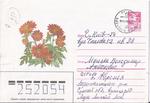Letter sent from: Village of Byshiv, Makariv raion, Kyiv oblast
Letter describes events in 1932-1933 in: Village of Viktorivka, Kaharlyk raion, Kyiv oblast
Current location name: Village of Viktorivka, Myronivka raion, Kyiv oblast
The author was born in 1925 and came from a family of 5 (her parents and 2 sisters); a little sister died of famine.
Luzan had only 3 grades of education, she is hardly literate. She writes that they had enough food in 1933 to survive and that the harvest was good. It was the "Stalinist laws" made her family starve.
Her mother knew they had to join the kolhosp from attending a meeting; her father was sick and soon died. Before he died he hid 10 sacks of wheat grain in the haystacks; a search brigade of 20 people found and took everything, laughing. A neighbor who was a member of the brigade noticed some bean stocks hidden behind the stove but did not say anything. Mother asked her, a child, not to watch "this grief."
Her mother was struggling to put a roof over their head. Mother's supervisor (bryhadyr) cheated her our of bricks she had found to build a stove. She would walk after work 25 km to their grandfather's village to get some food from him.
Mariia mentions how people were begging for food in 1933 and were "sharing each bread crumble."
Even later, after the famine, peasants were slammed with heavy taxes and barely made ends meet.
The author was taken as ostarbeiter (slave laborer) to Germany in 1942; she survived the 1946-47 famine; after that famine, peasants started making some money and getting some food from working in kolhosps (collective farms).
She describes persecution she had to endure locally. Letter is transcribed partially.
Ukrainian transcription is available.



